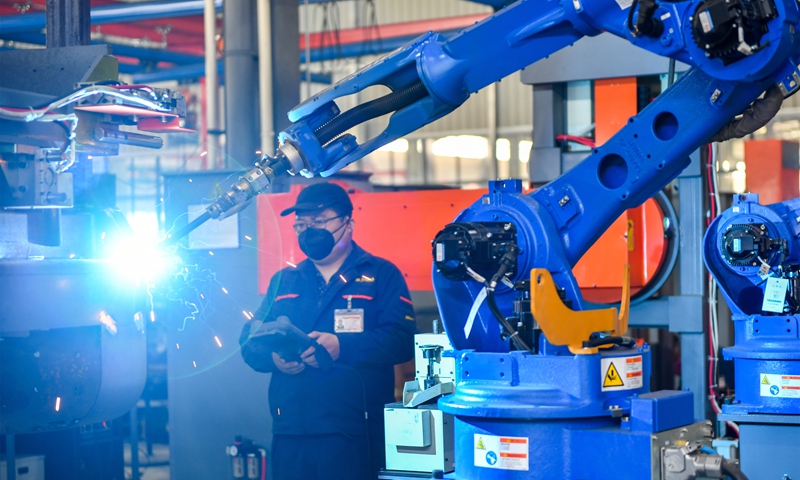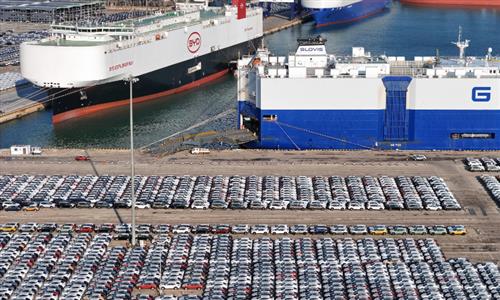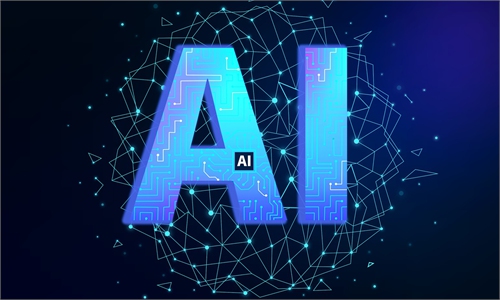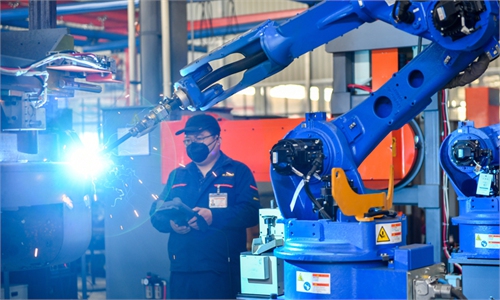
A worker controls an automated robot workstation operating at high speed in a digital workshop in Huzhou, East China's Zhejiang Province on November 30, 2021. Photo: VCG
A Chinese scientist and national political advisor has proposed further integration of artificial intelligence (AI) in the manufacturing industry, with the aim of boosting its high-quality development and dealing with the challenges ahead.
"AI is an important driving force in the new round of technological revolution and industrial change. It has emerged as a useful tool for significantly facilitating the upgrading process of the basic manufacturing industry as well," said Zhao Xiaoguang, associate professor of the Institute of Automation at the Chinese Academy of Sciences. Zhao is also a member of the National Committee of the Chinese People's Political Consultative Conference (CPPCC).
In a proposal shared with the Global Times, Zhao called for accelerating the application of AI technology in industry, so as to tackle the challenges raised by a new round of technological revolution and transform scientific and technological achievements into practical results.
China has been expanding the applications of AI technology in its real economy, according to Zhao, especially in areas such as advanced manufacturing, the new material and new energy sectors, and medicine. Also, new quality productive forces empowered by AI technology are in the pipeline.
Having been committed to research projects in the field of robotics, intelligent control systems, and wireless sensor networks for years, Zhao believes that by embracing AI, China's basic manufacturing sector will ratchet up its capability to meet various demands on the supply side and raise its competitiveness in the global market.
China has already made significant progress in AI advancement and high-quality development of its robotic industry. For instance, Shenzhen-based UBTECH Robotics has successfully developed humanoid robots that can be used at a new energy vehicle (NEV) factory. This was the world's first case of a humanoid robot being used to collaborate with humans in assembly and quality inspection operations in an automobile factory.
With the rapid development of AI and its expanding industrial applications, China has large room for development in the manufacturing industry, and will continue to make contributions to the world's economic growth, Zhao said, noting that Chinese domestically made products have gained competitiveness in terms of scale and quality.
China will strive to modernize the industrial system and develop new quality productive forces at a faster pace, according to the Government Work Report submitted to the second session of the 14th National People's Congress on Tuesday.
The report listed several tasks, including industry and supply chain improvement and upgrading, and the cultivation of emerging sectors and future-oriented industries such as hydrogen power and new materials. Innovative development of the digital economy will be promoted, with an AI-Plus initiative to be launched, according to the Xinhua News Agency.
The AI Plus initiative is set to become a significant factor in bolstering the high-quality development of the manufacturing industry as well. To realize this goal, Zhao told the Global Times that efforts should be made to establish a diversified evaluation and reward system in order to encourage research teams and academic institutions with scientific and innovation advantages to give strong technical support in development of the sector.
Zhao also suggested diversified resources including private capital, industrial funds, and multi-channel financing could help to develop more professional large-scale AI models in specialized and new enterprises in the manufacturing industry.
Meanwhile, the authorities should help to release a number of open-source projects in the manufacturing industry so that they can empower enterprises to embrace digital and intelligent transformation, Zhao said.




